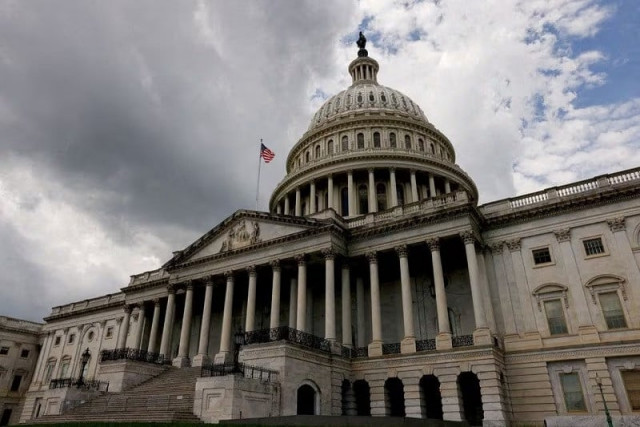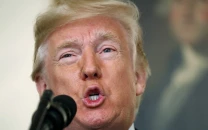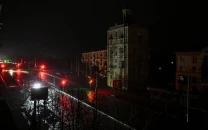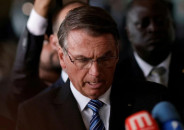US Supreme Court tightens rules for charging Jan 6 rioters, Trump with obstruction
Justices throw out lower court's decision that allowed a charge of corruptly obstructing an official proceeding

The US Supreme Court raised the legal bar for prosecutors pursuing obstruction charges against defendants involved in the January 6, 2021, attack on the Capitol in a ruling on Friday with potential implications for the federal criminal case against Donald Trump for trying to undo his 2020 election loss.
The justices ruled 6-3 to throw out a lower court's decision that had allowed a charge of corruptly obstructing an official proceeding - the congressional certification of President Joe Biden's victory over Trump that the rioters sought to prevent - against defendant Joseph Fischer, a former police officer.
The justice directed the lower court to reconsider the matter.
The court, in the decision authored by Chief Justice John Roberts, ruled that an obstruction conviction requires prosecutors to show that a defendant "impaired the availability or integrity" of documents other records related to an official proceeding - or attempted to do so.
Roberts was joined by fellow conservative Justices Clarence Thomas, Samuel Alito, Neil Gorsuch and Brett Kavanaugh, as well as liberal Justice Ketanji Brown Jackson.
Read: Key takeaways from the US presidential debate as Trump and Biden clash on stage
Roberts rejected the Justice Department's more expansive reading of what constitutes obstruction, calling it "a novel interpretation (that) would criminalize a broad swath of prosaic conduct, exposing activists and lobbyists alike to decades in prison."
Conservative Justice Amy Coney Barrett wrote a dissent that was joined by liberal Justices Sonia Sotomayor and Elena Kagan.
Fischer had challenged the obstruction charge, which federal prosecutors brought against him and hundreds of others - including Trump - in January 6-related cases.
The ruling was a potential boost for Trump, the Republican candidate challenging Biden, a Democrat, in the November 5 US election. Trump was hit with the obstruction charge as part of a four-count criminal indictment in a case brought last year by Special Counsel Jack Smith. The charge falls under the 2002 Sarbanes-Oxley Act, a federal law passed after the accounting fraud scandal at now-defunct energy company Enron.
'Peaceful transfer of power'
The Biden campaign in a statement said the court's ruling "does not change the fundamental truth that Donald Trump will always put himself over our democracy."
"Violent insurrectionists and those who encourage them must be held accountable, but Donald Trump thinks otherwise. Just (Thursday) night, Trump again defended January 6 and the insurrectionists who violently assaulted law enforcement officers and tried to prevent the peaceful transfer of power," the Biden campaign statement said, referring to Thursday's debate between the president and Trump.
Attorney General Merrick Garland criticized Friday's ruling.
"January 6 was an unprecedented attack on the cornerstone of our system of government - the peaceful transfer of power from one administration to the next," Garland said. "I am disappointed by today's decision, which limits an important federal statute that the department has sought to use to ensure that those most responsible for that attack face appropriate consequences."
Fischer was accused by prosecutors of charging at police guarding a Capitol entrance during the attack. Fischer, at the time a member of the North Cornwall Township police in Pennsylvania, got inside the building and pressed up against an officer's riot shield as police officers attempted to clear rioters, according to prosecutors. He remained in the Capitol for four minutes before police pushed him out, they said.
Fischer has been awaiting trial on six other criminal counts, including assaulting or impeding officers and civil disorder, while his challenge to his obstruction charge has proceeded.
Read More: Democrats in disarray after Biden's shaky debate against Trump
US District Judge Carl Nichols, a Trump appointee, granted Fischer's request to dismiss the obstruction charge, ruling it applies only to defendants who tampered with evidence. The US Court of Appeals for the District of Columbia Circuit reversed that decision, prompting Fischer's appeal to the Supreme Court.
Federal prosecutors estimate that about 250 of the roughly 1,400 people charged in the Capitol attack by Trump supporters could be impacted by the ruling. According to Justice Department data, about 50 January 6 defendants were convicted and sentenced on the obstruction charge with no other felony. Of those, about half are currently serving a sentence of incarceration - representing less than 2% of all charged cases.
The charge carries a sentence of up to 20 years in prison if convicted, though January 6 defendants convicted of obstruction have received far lesser sentences.
The legal issue in the case involved how two parts of the obstruction law fit together. The first provision prohibits obstructing an official proceeding by destroying "a record, document or other object." The second part makes it a crime to "otherwise obstruct" an official proceeding.
The Justice Department argued that Congress included the second provision to give the obstruction law a broad sweep.
The Supreme Court heard arguments in the case in April.
Capital Riots
After the 2020 election, Trump and his allies made false claims that it had been stolen from him through widespread voting fraud. On the day when Congress met to certify Biden's victory, Trump supporters stormed the Capitol, broke through barricades, attacked police officers, vandalized the building and forced lawmakers and others to flee for safety.
In August 2023, Smith brought four federal criminal counts against Trump in the election subversion case: conspiring to defraud the United States, corruptly obstructing an official proceeding and conspiring to do so, and conspiring against the right of Americans to vote.
Also Read: From Biden to Harrison: 10 oldest US presidents
Trump in a separate case brought in New York state court was convicted by a jury in Manhattan on May 30 on 34 counts of falsifying documents to cover up hush money paid to a porn star to avoid a sex scandal ahead of the 2016 election.
Trump also faces election-related criminal charges in state court in Georgia. He has called all the cases against him politically motivated.
The Supreme Court heard arguments on April 25 on Trump's bid for immunity from prosecution for trying to undo his 2020 election loss. The court's conservative justices signaled support for US presidents having some level of immunity from criminal charges for certain acts taken in office. A ruling in that case is expected on Monday.
In another closely watched Trump-related case, the Supreme Court on March 4 overturned a judicial decision that had barred him from the ballot in Colorado office under a constitutional provision involving insurrection.



















COMMENTS
Comments are moderated and generally will be posted if they are on-topic and not abusive.
For more information, please see our Comments FAQ